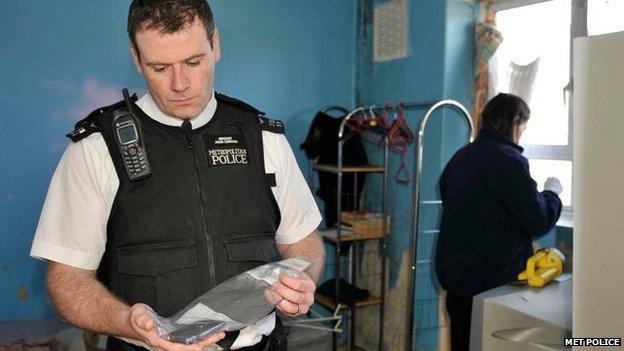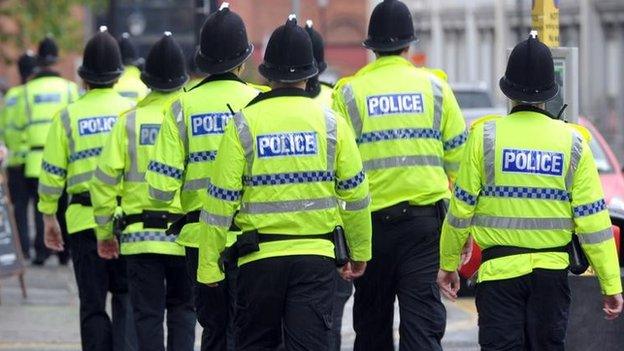Crime in England and Wales falls to new record low
- Published

The figures show the types of crime are changing
Crime has fallen to new record low levels in England and Wales, despite some increases as a result of changes in how police record incidents.
The official crime survey found there were seven million incidents in the year to September 2014 - down 11% on the previous 12 months.
Police recorded crime remained stable at 3.7 million incidents - but with rises in violence and sexual offences.
The Office for National Statistics says those rises relate to better recording.
The figures published on Thursday are the penultimate results before the general election in May. Official figures on crime are published every quarter and are drawn from two sources. The Crime Survey for England and Wales (CSEW) and incidents reported to the police and recorded by them.
The CSEW, which questions 35,000 people, estimates that crime is now at its lowest level since the rolling study began in 1981.
Last year, the national statistics watchdog said it could no longer approve figures recorded by the police because they were unreliable - prompting major revisions of how each force handles its figures.
That review has played a key part in a 16% rise in recorded violence, a 10% rise in public order offences and a 22% rise in sexual offences.
'Broken promise'
Forces recorded 24,000 rapes and almost 49,000 other sexual offences - the highest numbers since comparable records began in 2002-03. The ONS said these rises were thought to be down to the improvements in how police were recording crimes and a greater willingness of victims to come forward than before.
The latest figures also appear to underline a developing shift in crime away from more visible and publicly obvious offences, such as robbery, to those that are more difficult to identify.

Police recorded a 5% increase in fraud to around 212,000 incidents - four times the rate of robbery in England and Wales. Experts think fraud and cyber-crimes remain substantially under-reported.
At the same time, the CSEW estimated that 5% of people had been victims of bank card fraud, a statistically significant rise on the year before. The figures suggest that the chance of being a victim of bank card crime is now higher than suffering theft of personal property.
There was also an increase in sexual material offences, linked to the online distribution of abuse images via computers or mobile technology.
Chief Constable Jeff Farrar of Gwent Police, who speaks for all forces on crime statistics, said: "Our challenge is to deal effectively with the growing demand from complex public protection issues and cyber-crime - where the offences, and the outcomes of the police response, are not easily measured in the current system - while further improving recording and keeping traditional types of crime down."
David Cameron praised the results. "It's encouraging to see that crime is at its lowest level since records began in 1981," he said.
"The police are doing a great job."
But shadow policing minister Jack Dromey said the government had "broken its promise to protect front line police".
"The police are struggling to cope with the sheer scale of criminal investigation into child sex exploitation and abuse and rapidly growing fraud and online crime," he said.
"The home secretary continues to insist that they have cut the police but they have also cut crime, despite the fact her assertions do not include all crime."
- Published21 January 2014
- Published21 April 2014